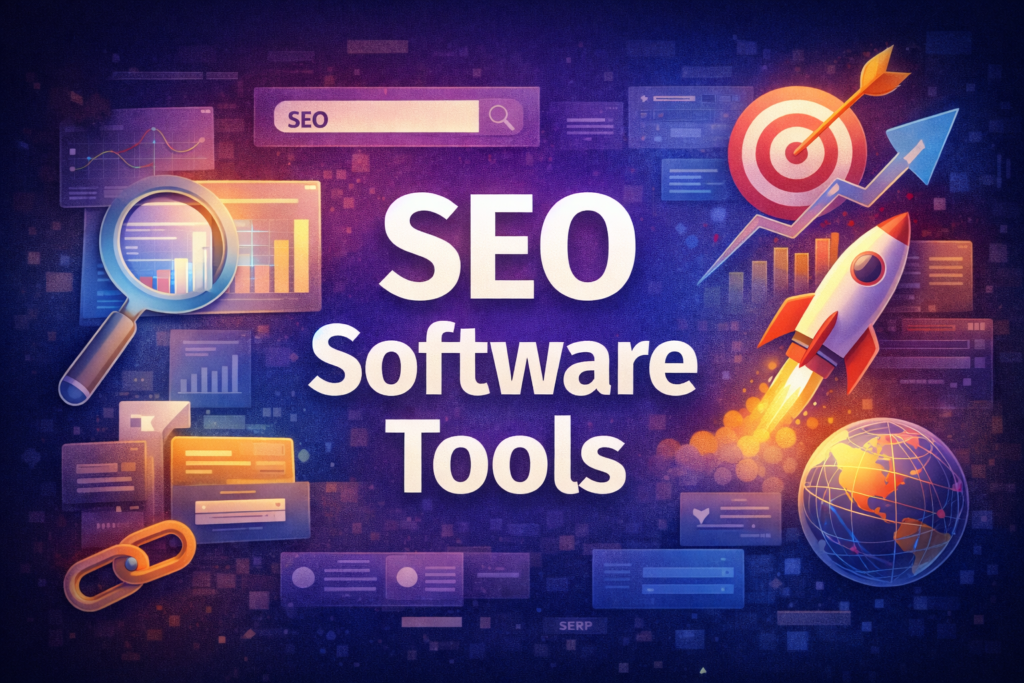Mastering SEO Strategy: A Comprehensive Guide for Online Success
In the digital age, having an effective SEO strategy is crucial for any business looking to thrive online. SEO, or Search Engine Optimization, is the art and science of optimizing your website to rank higher on search engine results pages (SERPs). A well-planned SEO strategy can significantly boost your online visibility, attract targeted traffic, and drive conversions. In this blog, we’ll explore the essential components of a successful SEO strategy, along with practical tips to implement them.
1. Define Your Goals
The first step in developing an SEO strategy is to define your goals. Ask yourself what you want to achieve. Common objectives include:
- Increasing Website Traffic: Attracting more visitors to your site.
- Generating Leads: Capturing contact information from potential customers.
- Boosting Sales: Increasing the number of purchases made through your site.
- Enhancing Brand Awareness: Making your brand more recognizable in your industry.
Once you have clear, measurable goals, you can tailor your SEO efforts to meet these objectives effectively.
2. Conduct Thorough Keyword Research
Keyword research is the cornerstone of any successful SEO strategy. It involves identifying the terms and phrases that potential customers use when searching for products or services similar to yours. This step is crucial because targeting the right keywords will attract the right audience.
Tips for Effective Keyword Research:
- Use Keyword Tools: Tools like Google Keyword Planner, Ahrefs, and SEMrush can help you discover keywords with significant search volume and manageable competition.
- Understand Search Intent: Differentiate between informational, navigational, and transactional searches. Knowing the intent behind a keyword helps you create content that meets users’ needs.
- Focus on Long-Tail Keywords: These are longer, more specific phrases that often have lower competition and higher conversion rates. For example, instead of targeting “shoes,” aim for “best running shoes for flat feet.”
3. Optimize Your Website Structure
A well-organized website structure is vital for both user experience and SEO. It helps search engines crawl your site effectively and ensures visitors can find what they need easily.
Key Elements to Focus On:
- URL Structure: Use clear, descriptive URLs that include your target keywords. For example, “www.example.com/womens-running-shoes” is more effective than “www.example.com/page1.”
- Navigation: Ensure your site is easy to navigate. A logical hierarchy helps both users and search engines find content more efficiently.
- Mobile Optimization: With a significant amount of search traffic coming from mobile devices, make sure your website is mobile-friendly. Google prioritizes mobile-optimized sites in its rankings.
4. Focus on On-Page SEO
On-page SEO refers to optimizing individual pages on your website to rank higher and earn more relevant traffic. This includes various elements:
Essential On-Page SEO Elements:
- Title Tags: Craft compelling title tags that include your target keywords. Keep them under 60 characters for optimal display in SERPs.
- Meta Descriptions: Write informative meta descriptions that summarize the content of your page. While they don’t directly impact rankings, they can improve click-through rates.
- Header Tags: Use header tags (H1, H2, H3) to structure your content. Include keywords in these headers to improve relevance.
- Image Optimization: Use descriptive file names and alt tags for your images. This not only helps with SEO but also improves accessibility.
5. Create High-Quality Content
Content is at the heart of any SEO strategy. High-quality content not only attracts visitors but also keeps them engaged. To create compelling content:
Content Creation Tips:
- Know Your Audience: Understand your audience’s interests and pain points. Tailor your content to provide solutions and valuable information.
- Diversify Content Types: Use a mix of blog posts, infographics, videos, and case studies to engage different types of users.
- Regular Updates: Keep your content fresh and relevant by regularly updating existing articles and adding new posts.
6. Build a Strong Backlink Profile
Backlinks, or inbound links from other reputable websites to yours, are a significant factor in SEO. They signal to search engines that your content is credible and valuable.
Strategies for Building Backlinks:
- Guest Blogging: Write articles for other reputable sites in your industry and include links back to your site.
- Create Shareable Content: Develop valuable resources, such as in-depth guides, that others will want to link to.
- Engage with Influencers: Building relationships with industry influencers can lead to backlinks and increased visibility.
7. Enhance User Experience (UX)
A positive user experience is crucial for SEO success. Search engines prioritize sites that provide a good experience for users.
Key UX Factors to Consider:
- Page Load Speed: A slow website can frustrate users and increase bounce rates. Use tools like Google PageSpeed Insights to monitor and improve your site’s speed.
- Mobile Friendliness: Ensure that your site is responsive and looks good on all devices.
- Engaging Design: An aesthetically pleasing and easy-to-navigate design can keep users on your site longer, reducing bounce rates.
8. Monitor and Analyze Your Performance
An effective SEO strategy requires continuous monitoring and analysis. Use tools like Google Analytics and Google Search Console to track your performance.
Key Metrics to Monitor:
- Organic Traffic: Keep an eye on how much traffic is coming from search engines.
- Bounce Rate: A high bounce rate may indicate that users aren’t finding what they expected on your site.
- Keyword Rankings: Track your keyword rankings to see how well your optimization efforts are paying off.
9. Stay Updated with SEO Trends
SEO is a dynamic field, with search engine algorithms constantly evolving. Staying informed about the latest trends and best practices is essential for ongoing success.
Ways to Stay Updated:
- Follow Industry Blogs: Subscribe to reputable SEO blogs such as Moz, Search Engine Journal, and Neil Patel’s blog.
- Attend Webinars and Conferences: Participate in industry webinars and conferences to learn from experts and network with other professionals.
- Join Online Communities: Engage with SEO communities on platforms like Reddit, LinkedIn, and Facebook to exchange ideas and learn from peers.
Developing a successful SEO strategy is a multifaceted process that requires careful planning, execution, and ongoing refinement. By defining your goals, conducting thorough keyword research, optimizing your website structure, focusing on on-page SEO, creating valuable content, building a strong backlink profile, enhancing user experience, monitoring performance, and staying updated with trends, you can position your business for long-term success in the competitive digital landscape.
Start implementing these strategies today, and watch your online presence flourish
Ariel Gal is a digital strategist specializing in scalable web platforms, SEO architecture, automation, and AI-enabled growth. His work focuses on turning complex digital systems into reliable business infrastructure.


